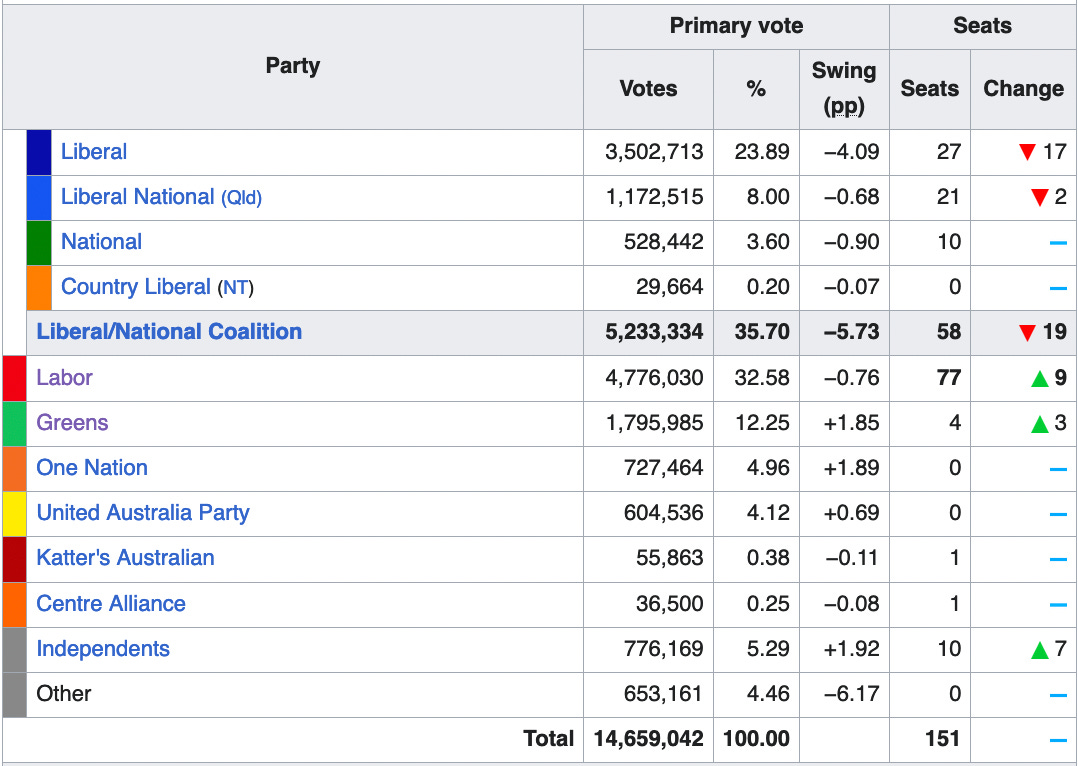Mythbusting Kevin Bonham on how voting works
Kevin Bonham, has a twitter thread up disputing my telling of wasted vote. Here’s the thread itself. It contains a large number of incorrect assertions. Let’s mythbust.

he asked Antony to do his "research" for him
This is not correct. I asked Antony if he happened to know a particular figure. I didn’t ask him to do research at all.
djrobstep has a lunatic concept of "wasted vote" that for NSW includes every vote that doesn't land with the winner, every voter who chooses to exhaust their vote, and the winner's entire victory margin.
Each of these is quite obviously a wasted vote. I think everybody agrees that exhausted votes are wasted (they literally don’t make it to in the final runoff) so let’s cover the other two.
Votes that don’t land with the winner quite obviously don’t result in anybody getting elected. If that vote had not been cast, or magically disappeared, the end result would be identical - the same candidate would have won. Thus, that vote has no effect on representation.
Likewise, excess votes could all magically disappear and also leave the outcome unchanged. Win by 10 or win by 10000, none of those votes matter beyond the first winning one in terms of the seats allocated.
As I’ve noted before, this is intuitively obvious to anybody who has been involved in any kind of election campaigning in Australia. You choose target seats based on which seats you think you can help swing, and focus your efforts there. You ignore safe seats.
Why do you do this? Because additional votes in safe seats don’t change the outcome. But if you can flip a swing seat, that means a whole lot less of your votes end up wasted. Instead of finishing as (wasted) losing votes, they finish as winning votes. And because the margin of victory is usually smaller than a safe seat, less votes get wasted as excess winning votes too.
This stuff is just basic, obvious intuition that everybody who has thought about political tactics knows intuitively. And yet, somehow Kevin thinks it’s a lunatic move to point it out. Weird.
He actually explicitly states that the winner's margin of votes are "unrepresented" as if you can pick out of everyone who voted for the seat winner and say that this many people contributed to the win and this many didn't.
This is just a bizarre denial of the basic concepts of fungibility and winning margin.
Votes are fungible. If I pour 3 litres of water into a 2 litre container, I don’t need to know which particular atoms of water will overflow to tell you how much will overflow. Likewise with votes. To beat the other guy, you need to win by 1. Anything above that is excess. It doesn’t contribute to the win, because you’ve already won. If Candidate A beats Candidate B by 30000 to 20000, then 20001 of those A votes were required to win (any less and they wouldn’t have won, they’d have tied or lost), but 9999 were excess.
Again this is something that any sports fan can tell you. If your favourite team thrashes another team by 100 points, it’s certainly fun, but at the end of the day winning by 1 was all you needed, and the extra 99 don’t change the fact that you won the game.
This has its roots in methods used to detect gerrymanders in the USA (by comparing supposed "wasted votes" between parties) but he doesn't do that.
I did exactly that, actually. In my original “gerrymandering” post, I discussed the wildly differing amount of wasted votes between parties.
Instead he refers to the total of supposed "wasted votes" and claims on that basis to have detected a gerrymander.
The total amount of wasted vote is interesting for multiple reasons.
The more wasted vote, the more potential for unrepresentative outcomes. Near-zero wasted vote implies a highly representative outcome. An election with a high level of wasted vote, meanwhile, *can be* representative, but that is entirely dependent on how the non-wasted votes are distributed between electorates - that is, the geographic dispersal of voters throughout various electorates.
A result with high wasted vote but high proportionality is a coincidence of dispersal. Parties that are advantaged by that dispersal will tend to resist changing that system - keeping it in place on order to gain more seats than they would otherwise be entitled. Sound familiar?
Also, the total amount of wasted vote is in itself a measure of democratic legitimacy or mandate. 60% wasted vote means the parliament is literally not representing 60% of voters in a fundamental sense. That should deeply offend the sensibility of anybody who claims to support democracy.
the concept he's misusing without understanding what it is for is better referred to as inefficient distribution. It's for looking at cases where, eg, one party has a few big wins and a lot of narrow losses and hence gets ripped off by the system. It's not an issue here.
Of course it’s an issue here. If it were not, the results of the last federal election would not look like this:
Can anybody really look at this and claim the Greens aren’t being being “ripped off” here, with 12% of the vote but only 4 seats in 151?




